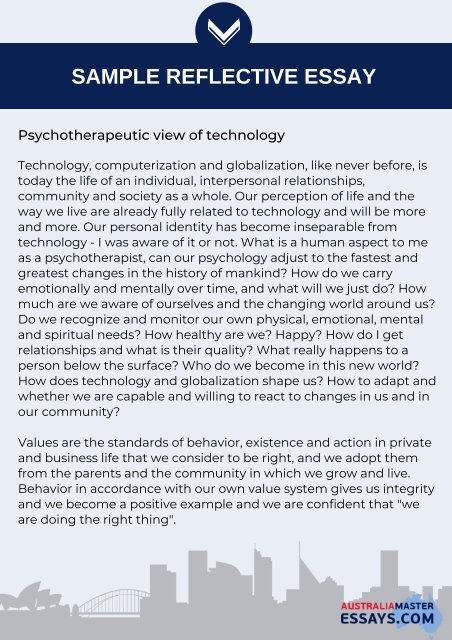Psychotherapeutic view of technology
Need help with your sample reflective essay? Follow this link for more information https://www.australiamasteressays.com/
Need help with your sample reflective essay? Follow this link for more information https://www.australiamasteressays.com/
Create successful ePaper yourself
Turn your PDF publications into a flip-book with our unique Google optimized e-Paper software.
SAMPLE REFLECTIVE ESSAY<br />
<strong>Psychotherapeutic</strong> <strong>view</strong> <strong>of</strong> <strong>technology</strong><br />
Technology, computerization and globalization, like never before, is<br />
today the life <strong>of</strong> an individual, interpersonal relationships,<br />
community and society as a whole. Our perception <strong>of</strong> life and the<br />
way we live are already fully related to <strong>technology</strong> and will be more<br />
and more. Our personal identity has become inseparable from<br />
<strong>technology</strong> - I was aware <strong>of</strong> it or not. What is a human aspect to me<br />
as a psychotherapist, can our psychology adjust to the fastest and<br />
greatest changes in the history <strong>of</strong> mankind? How do we carry<br />
emotionally and mentally over time, and what will we just do? How<br />
much are we aware <strong>of</strong> ourselves and the changing world around us?<br />
Do we recognize and monitor our own physical, emotional, mental<br />
and spiritual needs? How healthy are we? Happy? How do I get<br />
relationships and what is their quality? What really happens to a<br />
person below the surface? Who do we become in this new world?<br />
How does <strong>technology</strong> and globalization shape us? How to adapt and<br />
whether we are capable and willing to react to changes in us and in<br />
our community?<br />
Values are the standards <strong>of</strong> behavior, existence and action in private<br />
and business life that we consider to be right, and we adopt them<br />
from the parents and the community in which we grow and live.<br />
Behavior in accordance with our own value system gives us integrity<br />
and we become a positive example and we are confident that "we<br />
are doing the right thing".
<strong>Psychotherapeutic</strong> <strong>view</strong> <strong>of</strong> <strong>technology</strong><br />
2<br />
When we do not behave in accordance with our values, then we are<br />
unhappy and feel bad about ourselves, we sin and are not ethical.<br />
Different people have different values, but if we look at general<br />
generational values now, we will notice the enormous difference<br />
between the value <strong>of</strong> our parents and us. The value systems we<br />
receive from them or no longer apply to us or their ranking by<br />
priorities is drastically different. In most cases, business success is no<br />
longer guaranteed if we are good, obedient, valuable, honest, and<br />
engage in years in the same job as our parents have taught us.<br />
Today there are some other values such as speed, flexibility,<br />
creativity, mobility, perfectionism, assertiveness and willingness to<br />
risk. Values related to understanding relationships and relationships<br />
have also changed.<br />
The idea <strong>of</strong> getting married, buying homes, children, and lending is<br />
getting lost. Today, we remain unmarried, we meet partners from all<br />
over the world via the internet if we want, keep distance, have<br />
heterosexual or homosexual relationships, partnerships no longer<br />
need to include only two people, explore, more or less openly, our<br />
own sexuality, etc. Actually, a certain chaos in us. We have not<br />
completely abandoned the old systems <strong>of</strong> values, and we are not<br />
aware <strong>of</strong> whether the new value systems are authentic to us, are<br />
they such as to support us in creating a life we want or perhaps not?<br />
Were we without thinking, questioning, and chewing ingested new<br />
ideas and values systems that we got with globalization and the<br />
development <strong>of</strong> <strong>technology</strong> and computerization? What really<br />
matters to us in life? What do we need? What do we want? Are we<br />
happy? Are we healthy? Do we follow this and support the value<br />
system that is in us or block and sabotage it?
<strong>Psychotherapeutic</strong> <strong>view</strong> <strong>of</strong> <strong>technology</strong><br />
3<br />
We do not have to look very far into the past to recognize clearly<br />
defined and strong external authorities with <strong>of</strong>ficial or natural<br />
legitimacy. For our parents and grandparents, these were state<br />
authorities: the government, the judiciary, the police, then the<br />
spiritual authorities, namely God, the Church, priests, secular<br />
authorities, teachers, pr<strong>of</strong>essors, doctors, community leaders, or<br />
parental authorities, most <strong>of</strong>ten the father as the head <strong>of</strong> the family.<br />
Generally speaking, individuals belonging to these generations<br />
explicitly or tacitly agreed to surrender a certain amount <strong>of</strong> their own<br />
freedom and subordinate themselves to external authority in<br />
exchange for the protection <strong>of</strong> the remaining rights and freedoms<br />
and security. What has happened in parallel to the development <strong>of</strong><br />
new technologies, globalization and the Internet is the demolition <strong>of</strong><br />
some <strong>of</strong> the external authorities, the pr<strong>of</strong>ound crisis <strong>of</strong> other<br />
authorities, and drastically reducing their impact on the individual.<br />
There has been a degradation <strong>of</strong> trust and power transfer or at least<br />
the power <strong>of</strong> external authority on the individual and his inner<br />
authority. Specifically, this means that the state and government are<br />
no longer recognized as the leading authorities that will ensure<br />
order, prosperity and economic stability for the vast majority <strong>of</strong> its<br />
citizens. The state's illusion arose as a "big provider" responsible for<br />
taking care <strong>of</strong> all children. There is also distrust or suspicion in the<br />
fairness <strong>of</strong> the laws themselves, the functioning <strong>of</strong> the judiciary and<br />
the police as a citizen's protection. And although there has been no<br />
anarchy, and we live in a somewhat edited state, the experience <strong>of</strong><br />
the state as an external authority has drastically changed. The<br />
authority <strong>of</strong> the Church is also questionable and changed, and<br />
although we are in a state that is secular and the Church's influence<br />
is strong, it is at the same time in crisis, and the psychological aspect<br />
<strong>of</strong> its impact on the individual has changed.
<strong>Psychotherapeutic</strong> <strong>view</strong> <strong>of</strong> <strong>technology</strong><br />
4<br />
Most <strong>of</strong> us no longer perceive God as an external repressive, allpowerful<br />
force with the threat <strong>of</strong> eternal hell. Fear <strong>of</strong> God's<br />
punishment, obsession with sin, guilt, forgiveness, and death has<br />
been lost in its power.<br />
The individual is increasingly turning to his own understanding <strong>of</strong><br />
God, the priests and the Church are all the less ultimate spiritual<br />
authorities, the more difficult we accept the imposed dogmas, and<br />
the more <strong>of</strong>ten we seek our own way and personal connection with<br />
God. A modern man seeks for love, peace, joy and security in his<br />
spiritual practice and in relation to God, and the Church is in the<br />
process <strong>of</strong> crisis and transformation. Lose the authority it had, and<br />
the new one was slowly built. Similar to secular microauthorities<br />
such as teachers, doctors and community leaders. Schooling as a<br />
system is rigid and has not been adapted quickly enough to social<br />
and technological change. And though there are shifts, they are still<br />
unable to meet the intellectual and emotional needs <strong>of</strong> the majority,<br />
provide knowledge and skills that are practically applicable and<br />
useful for the private, business and social life <strong>of</strong> an average individual<br />
in the modern, informative and global world <strong>of</strong> today. Another<br />
illusion that breaks down and for which education is only a part <strong>of</strong><br />
responsibility is that a diploma no longer means that an individual is<br />
capable <strong>of</strong> adequately performing the job for which he is educated<br />
and that he will find and have a successful work in the pr<strong>of</strong>ession<br />
after graduation. In this context <strong>of</strong> destruction, transformation, and<br />
change <strong>of</strong> external authority, enormous power and responsibility<br />
now move to an individual. It is not uncommon for an individual to<br />
feel that change as very stressful and burdensome and does not<br />
actually get into that. How to build your own inner authority? Based<br />
on what? How to be an authentic, positive leader to yourself and<br />
where to lead?
<strong>Psychotherapeutic</strong> <strong>view</strong> <strong>of</strong> <strong>technology</strong><br />
5<br />
For the first time we create our own internal authority in such a way<br />
in such an environment and we do not have adequate patterns or<br />
methods. In principle, to build our own authority, we must start from<br />
the feelings <strong>of</strong> personal power, and our base and the sense <strong>of</strong><br />
omnipotence must be sufficiently stable and healthy. However,<br />
personal power without a clear value system can be relied on<br />
"anything". Power with the questionable and underdeveloped inner<br />
authority can be constructive or destructive for us and our<br />
community. As humans we have a need for authorities - both inside<br />
and outside. Since they are external in crisis, and the interior is<br />
partially and / or insufficiently built, then we turn to the "<strong>of</strong>fered"<br />
authorities most <strong>of</strong>ten found in the media. What defines them is<br />
their beauty and popularity (the world's most famous) positive and<br />
negative achievements and wealth (athletes, rich people, <strong>technology</strong><br />
geniuses, criminals ...). Thus, certain individuals are conscious and<br />
unconsciously converted to the authorities by which we define what<br />
is success, beauty, (no) morality, good or bad etc. If there is no<br />
awareness <strong>of</strong> the need to build and monitor our own value systems,<br />
we possess personal power and freedom to we are creating a life and<br />
taking into account the external context, it may happen that we are<br />
oblivious <strong>of</strong> our own authority.<br />
All <strong>of</strong> this burden <strong>of</strong> responsibility, power, and (non) success, except<br />
that it is extremely stressful, creates internal chaos and can push us<br />
into anxiety, isolation, bullying and compulsion. Can our psyche find<br />
a way to choose and preserve the emotional and mental health <strong>of</strong><br />
the individual in times <strong>of</strong> extremely rapid change, great insecurity,<br />
tremendous power with corrupted external powers and insufficiently<br />
built internal powers, and unchecked, inefficient and inadequate<br />
value systems? I suppose this will be an extremely big challenge for<br />
all <strong>of</strong> us.
References:<br />
6<br />
Osiceanu, Maria-Elena (2015). Psychological Implications <strong>of</strong> Modern<br />
Technologies: “Techn<strong>of</strong>obia” versus “Technophilia”, Procedia -<br />
Social and Behavioral Sciences, 180, p. 1137 - 1144.<br />
Kushlev K., Proulx, J. D.E. & Dunn, E. W. (2017). Digitally connected,<br />
socially disconnected: The effects <strong>of</strong> relying on <strong>technology</strong> rather<br />
than other people, Computers in Human Behavior, 76, p. 68 - 74.<br />
Hall, J. A., & Baym, N. K. (2012). Calling and texting (too much): Mobile<br />
maintenance expectations, (over)dependence, entrapment, and<br />
friendship satisfaction. New Media & Society, 14 (2), p. 316 - 331.





